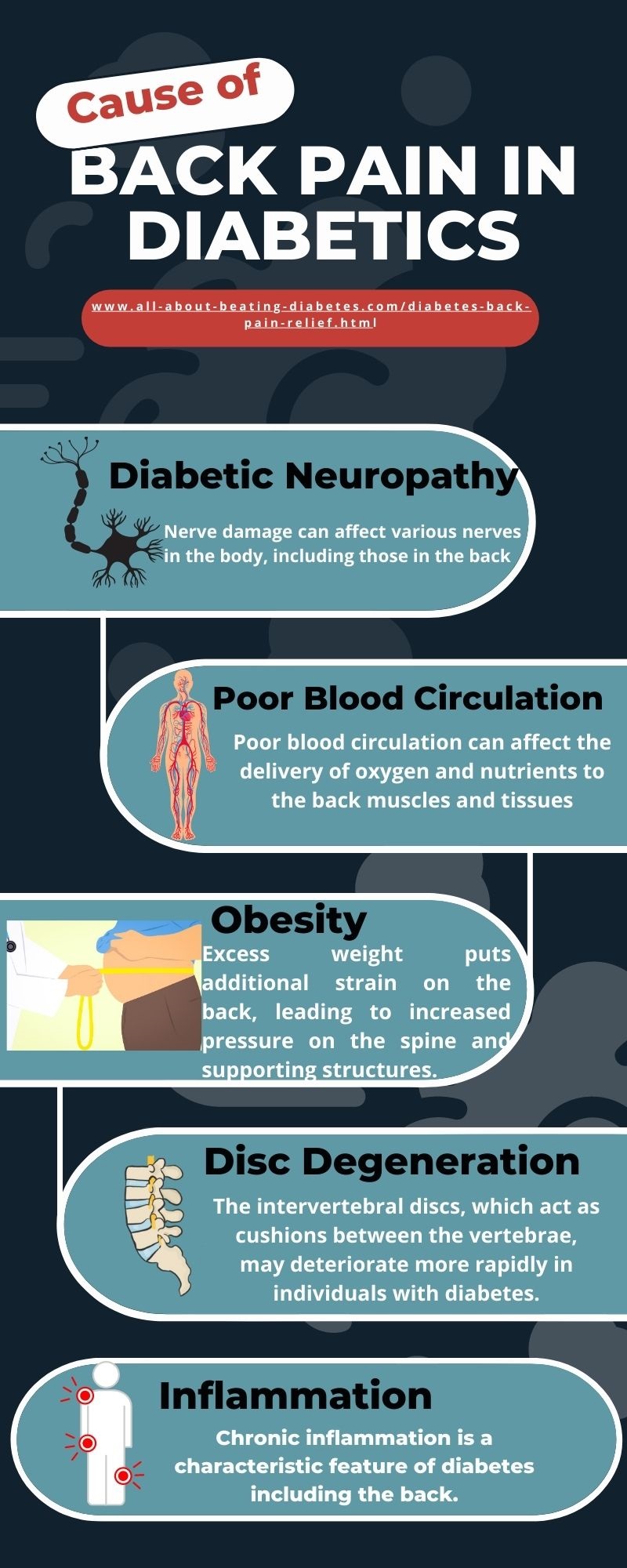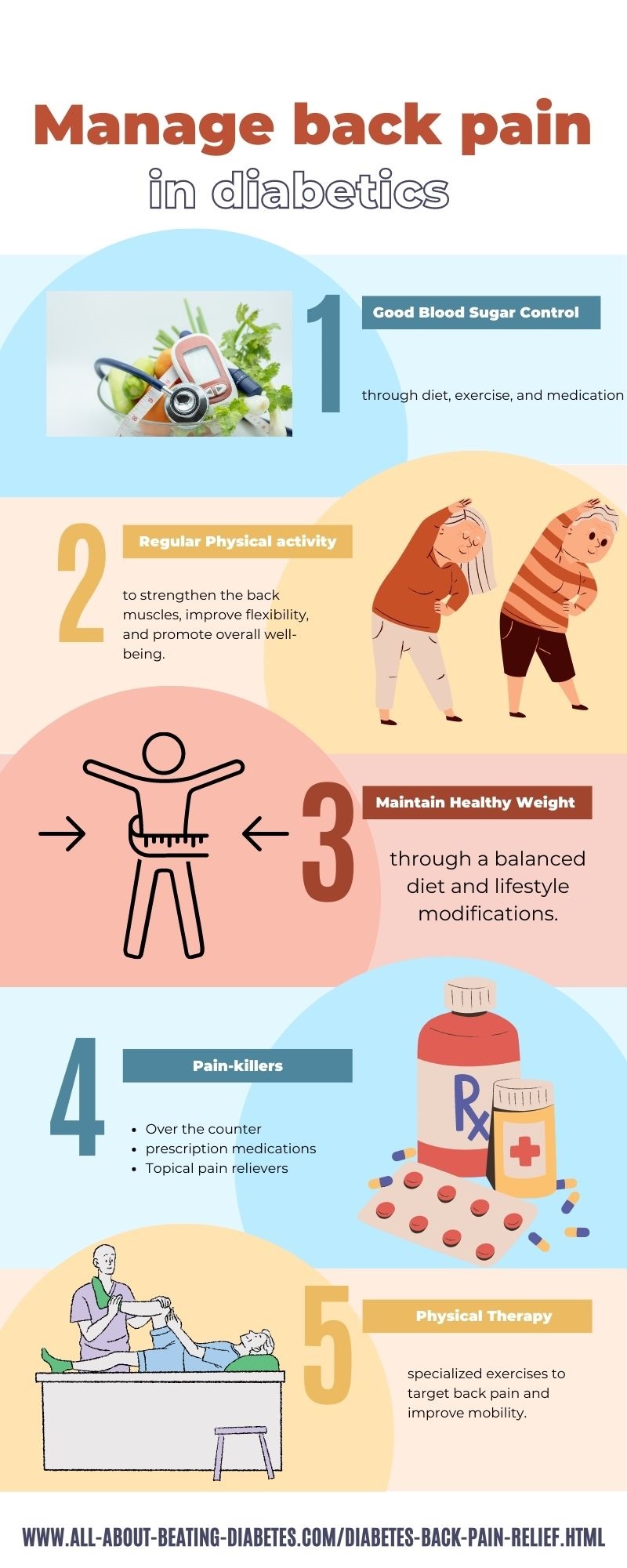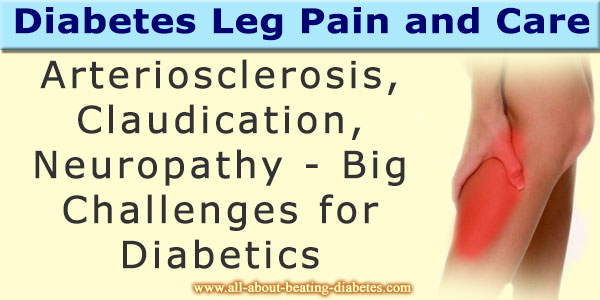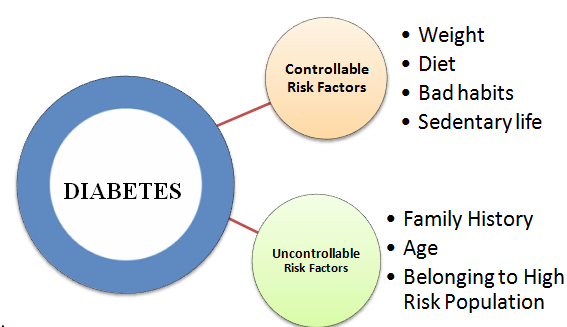Diabetes Back Pain Relief & Symptoms
Hi everyone,
Back pain is a common issue that can affect individuals with diabetes. Today, I would like to share the story of a 53-year-old man who has been grappling with type 2 diabetes and high blood pressure (hypertension) for the past five years.
Over the course of six months, he experienced a gradual escalation of back pain and stiffness, which has now reached a point where it hampers his ability to bend forward or sideways.
Engaging in simple tasks like sitting cross-legged, stooping, or rising from the bed without support has become a challenge for him.
Back Pain Symptoms in Diabetes
He also mentions that his stiffness slightly improves when he engages in movement. Three months ago, he had a similar experience with his neck, despite having no history of falls, significant trauma, abnormal weight lifting, or bone pain.
Additionally, he denies any previous instances of fever, ocular or urinary symptoms, oral ulcerations, or rashes. His body mass index (BMI) is 28.1 kg/m2, with a fasting blood sugar level of 102 mg/dL, postprandial level of 159 mg/dL, A1C level of 6.5%, total cholesterol of 230 mg/dL, LDL of 157 mg/dL, HDL of 41 mg/dL, and triglycerides of 154 mg/dL.
Based on radiological findings, osteophytes were observed without any other vertebral damage or signs of ankylosis. The diagnosis given was "diffuse idiopathic skeletal hyperostosis" (DISH), which is one of the musculoskeletal complications associated with diabetes.
The recommended course of action included weight loss to achieve a normal BMI, management of blood sugar and lipid profile (initiating Atovarstatin 20mg once daily), engaging in aerobic exercises focusing on flexibility to improve spinal mobility, and the use of a painkiller (Naproxen 250 mg twice daily).
During the three-month follow-up, the patient reported a reduction in pain and improved spinal mobility. Furthermore, his LDL level decreased to 98 mg/dL.
In summary, it is crucial to be mindful of musculoskeletal issues, especially as we reach middle age and if we have diabetes. It is important to persistently investigate and understand what is happening in order to take the necessary precautions in collaboration with our physicians.
Causes of Back Pain in Diabetics
There are several potential causes and factors that contribute to back pain in diabetics:

- Diabetic Neuropathy: Nerve damage, known as diabetic neuropathy, is a common complication of diabetes. It can affect various nerves in the body, including those in the back. This can result in pain, tingling, or numbness in the back and other areas.
- Poor Circulation: Diabetes can lead to poor blood circulation, which can affect the delivery of oxygen and nutrients to the back muscles and tissues. This may contribute to muscle weakness, pain, and slower healing of any back-related injuries or conditions.
- Obesity: Many individuals with diabetes also struggle with weight management. Excess weight puts additional strain on the back, leading to increased pressure on the spine and supporting structures, which can result in back pain.
- Disc Degeneration: Diabetes has been associated with an increased risk of disc degeneration. The intervertebral discs, which act as cushions between the vertebrae, may deteriorate more rapidly in individuals with diabetes, leading to back pain.
- Inflammation: Chronic inflammation is a characteristic feature of diabetes. Inflammation in the back can cause pain and discomfort.
Diabetes Back Pain Relief
To manage back pain in individuals with diabetes, it is important to address the underlying causes and effectively manage diabetes itself. This may include:
- Maintaining good blood sugar control through diet, exercise, and medication as prescribed by a healthcare professional.
- Regular physical activity to strengthen the back muscles, improve flexibility, and promote overall well-being.
- Maintaining a healthy weight or achieving weight loss through a balanced diet and lifestyle modifications.
- Medications for pain management, as prescribed by a healthcare professional.
- Physical therapy or specialized exercises to target back pain and improve mobility.
- Using proper body mechanics and ergonomics during daily activities to prevent further strain on the back.
- Regular check-ups with healthcare professionals to monitor and manage diabetes-related complications.
It is crucial for individuals with diabetes and back pain to consult with healthcare professionals for a comprehensive evaluation and personalized treatment plan.
All the best!
Dr.Alba
References:
References:
- American Diabetes Association (ADA): Their website provides comprehensive information about diabetes, including associated complications and management strategies. You can visit their official website at www.diabetes.org.
- Mayo Clinic: Mayo Clinic offers reliable medical information and resources on various health topics. Their website covers back pain, diabetes, and related conditions. You can access their website at www.mayoclinic.org.
- National Institute of Diabetes and Digestive and Kidney Diseases (NIDDK): NIDDK is a division of the U.S. National Institutes of Health (NIH) that focuses on diabetes, digestive diseases, and kidney-related conditions. Their website contains valuable information on diabetes and its complications, including back pain. You can visit their website at www.niddk.nih.gov.
- PubMed: This online database contains a vast collection of medical literature. By searching for relevant keywords such as "diabetes and back pain," you can find scientific studies, articles, and research papers that provide more in-depth information. Access to full-text articles may require a subscription or purchase.
- Physical Therapy for back pain.
- Ergonomics & body mechanics.
- The role of inflammation in Diabetes. Tsalamandris S, Antonopoulos AS, Oikonomou E, Papamikroulis GA, Vogiatzi G, Papaioannou S, Deftereos S, Tousoulis D. The Role of Inflammation in Diabetes: Current Concepts and Future Perspectives. Eur Cardiol. 2019 Apr;14(1):50-59. doi: 10.15420/ecr.2018.33.1. PMID: 31131037; PMCID: PMC6523054.
- Types of back pain related to Diabetes.








